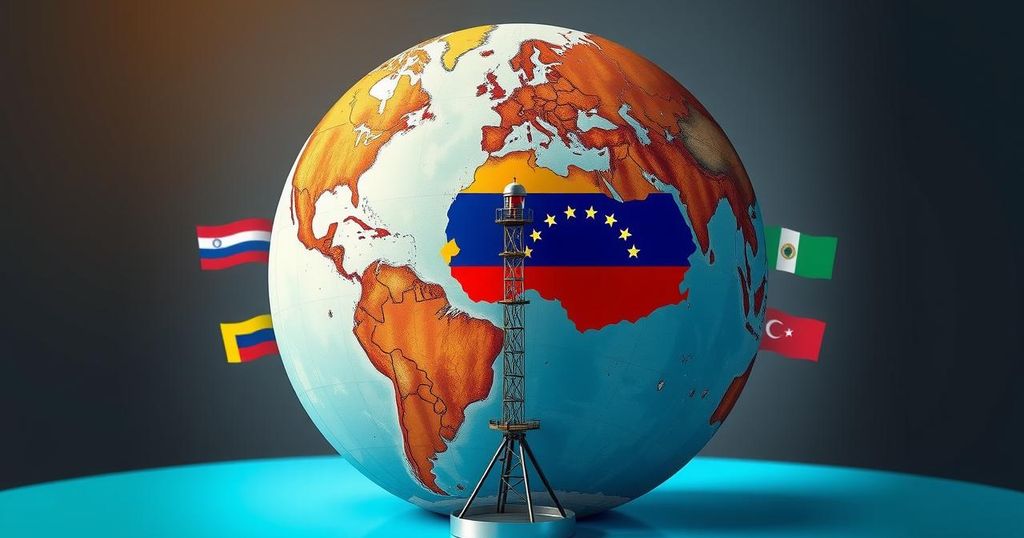Politics
AMERICA, ASIA, BIDEN ADMINISTRATION, CARACAS, CARIBBEAN, CHEVRON, CHINA, CUBA, DONALD TRUMP, ECONOMICS, EUROPE, EUROPE/ASIA, FRANCE, GEOPOLITICS, INDIA, MARCO RUBIO, MEXICO, NATIONAL SECURITY, NICOLAS MADURO, NORTH AMERICA, OFAC, OFFICE OF FOREIGN ASSETS CONTROL, RUSSIA, SOUTH AMERICA, SPAIN, TRADE, TRUMP, UNITED STATES, US, VENEZUELA
Omar El-Sharif
Emerging ‘America First’ Strategy Toward Venezuela: Implications and Developments
An “America First” strategy for Venezuela, initiated by an executive order from President Trump, seeks to impose tariffs on nations importing Venezuelan oil. This strategy aims to diminish foreign influence while preserving U.S. interests in Venezuela’s oil sector, notably with companies like Chevron. The administration is exploring negotiation avenues to promote democratic reforms and improve conditions amidst ongoing geopolitical tensions.
An “America First” approach to Venezuela is emerging, with significant implications. On March 24, President Donald Trump signed an executive order that grants Secretary of State Marco Rubio authority to impose a 25% tariff on goods from nations that import Venezuelan oil and gas. This action is positioned as a response to Venezuela’s high levels of migration and its antagonism toward U.S. interests.
The intricacies of this tariff initiative remain ambiguous. Venezuela currently exports oil and gas to a diverse range of countries, including both U.S. rivals like China and Russia, as well as allies such as India, Spain, and France. It is uncertain whether Trump plans to additionally tax Chinese products already subjected to tariffs or whether any allies would risk their imports of Venezuelan crude amid potential tariffs.
Concurrently, while foreign companies face restrictions, U.S. firms may find operations in Venezuela less impacted. Shortly following the tariff announcement, the U.S. Treasury Department extended Chevron’s deadline to cease operations from April 3 to May 27. This extension, along with the trend of renewing similar licenses, suggests that Chevron’s presence may solidify in Venezuela, albeit under stringent regulation.
Such strategies align with Trump’s overarching “America First” doctrine. The existing U.S. sanctions have failed to oust Nicolás Maduro and may have inadvertently strengthened relationships between Venezuela and rivals like China and Iran. Reportedly, oil sanctions have permitted Moscow and Tehran to deepen their ties with Caracas, creating challenges for U.S. interests in the region.
There appears to be little incentive for the U.S. administration to increase tariffs on allies like France or Spain. Instead, adjusting or revoking specific operational licenses may suffice, albeit potentially facilitating opportunities for rival countries to enhance their influence should U.S. companies withdraw from Venezuela.
China’s deepening ties to Venezuela are evident. The Chinese Foreign Ministry has dismissed the potential impact of U.S. tariffs, asserting that the measures would only harm American consumers. Despite challenges, Venezuelan oil is likely to continue flowing into China, negating the effectiveness of U.S. strategies.
U.S. officials are undoubtedly cognizant of the geopolitical ramifications posed by these developments. Recognizing Venezuela’s crucial oil reserves, the U.S. has engaged diplomatically, as demonstrated by Presidential Envoy Richard Grenell’s recent visits, which resulted in the release of six American hostages.
The administration’s approach reflects a familiarity with negotiation. They are currently sustaining dialogue with both Chevron and the Maduro government while speculating on potential compromises. Key issues include migration and legal reforms in the oil sector, which could incentivize U.S. companies to maintain operations in Venezuela even amidst broader multinational withdrawals.
Furthermore, there seems to be an opening for constitutional reforms as Maduro contemplates changes to Venezuela’s 1999 charter. While it is unlikely that these reforms will jeopardize his power, the U.S. could leverage support for oil sector expansion to extract progress on democratic reforms, such as releasing political prisoners and restoring competitive electoral conditions.
In summary, the U.S. must strategically utilize existing resources and diplomatic channels to influence Venezuela’s trajectory positively while advancing its own interests. By fostering an environment conducive to democratic reforms, the U.S. can work toward restoring stability in Venezuela while curbing unauthorized foreign influence.
The evolving “America First” strategy regarding Venezuela presents both opportunities and challenges for U.S. foreign policy. While efforts to impose tariffs may seem beneficial in dismantling foreign influence, the results remain ambiguous, particularly concerning relationships with allies and rivals. Furthermore, the potential for deeper engagement with U.S. companies like Chevron underscores a shift toward negotiation. Ultimately, the U.S. aims to leverage its strategies to promote democracy in Venezuela while protecting its energy interests and countering rival influences.
Original Source: www.atlanticcouncil.org








Post Comment